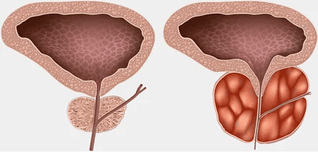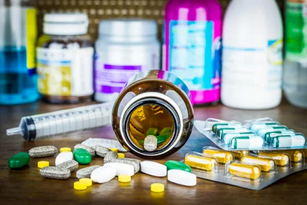
Most medications are prescribed to treat prostatitis. During the transition, the patient must take different categories of drugs. Some aim to relieve the symptoms that cause anxiety, some purposefully act on the affected gland, and most importantly - eliminate the root cause. At the same time, drugs differ in their potency, as some are acute elimination and some are chronic. Let's look at the most popular drugs used in the treatment of prostatitis.
Types of drugs for prostatitis
All medications prescribed by the attending physician can be roughly divided into several categories according to the method of administration:
- Tablets and capsules- taken orally, moderately absorbed by the body, in the case of capsules, absorption is faster, because all the components reach their destination shortly after melting the gelatinous shell.
- Injections- There may be both liquid and powder preparations diluted in a working fluid, usually anesthetic, intramuscular or intravenous, and the effect is noticeable after a few minutes. . . .
- rectal suppository (suppository)- has anti-inflammatory, antibacterial and analgesic effect, is inserted into the rectum near the patient, and in this case it should take about half an hour for the drug to dissolve completely. and absorbed.
- Instillations- a group of drugs that have the maximum positive effect only if they are delivered directly to the affected prostate gland, as they are administered through the urethra.
- Microclycers- This usually includes over-the-counter medications, such as herbal solutions, that are not a substitute for medication, but can be a good painkiller or prophylactic.

It should be noted that some drugs can be sold in several forms, such as tablets and suppositories, so the attending physician must indicate this feature.
The most popular drugs for the treatment of prostatitis
Drug treatment of prostatitis is a very complex procedure that requires the doctor to choose the right medication that will not only relieve pain and other symptoms, but also help eliminate the root cause of the disease. The disease itself can have a different origin, can manifest itself in acute or chronic forms, and is widely disturbed by the patient, limiting both natural activities and leading to complete infertility.
Classic tablets, suppositories for intramuscular injection and rectal application can be used in the treatment of prostatitis. The choice of a drug depends on the urgent need to deliver its components directly to the affected organ.
Additional Tools
Treatment of prostatitis is not limited to a list of a few drugs. Specialists can also use other types of drugs of different categories.
Fluoroquinolones
Fluoroquinolones are antibacterial drugs used in the treatment of tuberculosis of prostatitis. These drugs are used in a complex way, and the patient can be prescribed a course of four or more drugs at once.
Cephalosporins
Cephalosporins are antimicrobial drugs that target specific types of bacteria.
Such drugs can have a broad and targeted spectrum of action, and the need to use this or that agent depends directly on the form of the disease and the cause of its occurrence.
Macrolides
Macrolides are rarely used in the treatment of prostatitis because they are aimed at fighting some bacteria, such as mycoplasma and chlamydia. By the way, a disease like chlamydia is often accompanied by prostatitis, so doctors prescribe several tests at once to identify problems with the prostate gland in the early stages.
In acute manifestations of prostatitis, the attending physician may prescribe several drugs of different categories at the same time. This approach allows you to effectively combat both the symptomatology and the disease itself.
Analgesics
The vast majority of analgesics are prescribed in the presence of acute pain syndrome, which is an integral part of chronic but more acute prostatitis. The use of this group of drugs outside the treatment of the disease is not recommended, because the body quickly gets used to them, and to achieve an analgesic effect requires an increase in the dose, which can adversely affect the liver and kidneys. The course of analgesia is determined individually.
Alpha-blockers and muscle relaxants
The main task of these groups of drugs is to reduce the tension in the spasmodic muscles of the bladder, urethral canal, and at the same time reduce the pressure in the pelvic region. These drugs help to relieve anxiety and normalize the process of urination.
Immunomodulators
Such preparations contain mainly natural substances, in the case of prostatitis - extracts based on bovine prostate tissue. Regardless of the drug, they all have a common principle of action and allow them:
- slow down the process of inflammatory processes;
- increase smooth muscle tone and bladder walls;
- minimize the possibility of blood clots;
- improve blood circulation in the prostate gland;
- reduce prostate volume.
Immunomodulators can be used for a number of diseases, including chronic prostatitis, acute non-infectious prostatitis, and prostate adenoma.
In addition, such funds are actively used for prophylactic purposes, which helps to prevent the occurrence or recurrence of the disease.
Vitamins and dietary supplements
Remedies in these categories can reduce inflammation, improve fluid drainage, and get rid of blockages. The need for such drugs is due to the lack of nutritious food, especially during a course of antibiotics.
Prostatitis is a very complex disease that only a real specialist should deal with. Self-medication is definitely not recommended, as this approach has a large proportion of complications in the form of infertility, impotence and even the risk of developing cancer. The use of drugs for prostatitis without consulting a doctor can lead to the fact that it is impossible to get rid of the disease without surgery. In addition, self-medication is complicated by the impossibility of making an accurate diagnosis, as it requires appropriate equipment and information.
We must not forget that most of the drugs used to treat prostatitis are quite toxic, and some types are simply not suitable. If you feel pain in the pelvic region during urination, stool, or ejaculation, go to the toilet often, and if you can't urinate normally, don't risk it - see your doctor. Thus, you will not only prevent the unpleasant course of the disease, but also avoid the development of a chronic form, which you will have to live your whole life. In addition, your sexual activity will not be disrupted, and with timely treatment you can have a completely normal and healthy offspring.
























